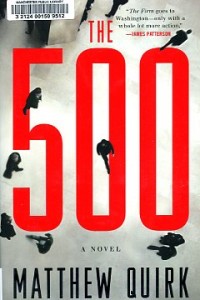 I read the The 500 in three sittings: Thursday evening, Friday afternoon, and Friday evening. Apart from going to the Mystery book club meeting and sleeping, it was continuous. So, yep, it was a page-turner.
I read the The 500 in three sittings: Thursday evening, Friday afternoon, and Friday evening. Apart from going to the Mystery book club meeting and sleeping, it was continuous. So, yep, it was a page-turner.
It is a book that is similar to The Firm (Grisham) and Paranoia (Finder) but instead of the lead character becoming enmeshed in a law firm or a high tech company, it is a lobbying group. The story is told by the lead character, Mike Ford, beginning with his invitation to join the Davies Group while a student at Harvard Law School. In a short time, Ford is breaking the law to please his superiors, for which, in turn he is highly compensated.
The Davies Group focuses on getting results by establishing working relationships with the top 500 influential decision-makers in Washington. The methods of these lobbying associates are beyond orthodox. A dismissive reference is made to the conventional procedure used by other lobbyists – boring powerpoint presentations to congressional staffers. On the other hand, the Davies Group guarantees a result, or the client doesn’t have to pay. Of course, the fees begin at 15 million bucks! Needless to say, they get a result!
I no sooner finished this book when I read about the power of ESPN in the State of Connecticut. According to the New York Times, “ESPN employs one of the top lobbying firms in Connecticut and has spent $1.2 million on lobbying expenses since 2007, records show.” And what have they gotten for their investment?
- A $25 million subsidy that helps to erect the newest building on the sports network’s 123 acre campus headquarters.
- “ESPN has received about $260 million in state tax breaks and credits over the past 12 years, according to a New York Times analysis of public records. That includes $84.7 million in development tax credits because of a film and digital media program, as well as savings of about $15 million a year since the network successfully lobbied the state for a tax code change in 2000.”
I mention this story as an example of the relevance of the theme in The 500. If Quirk’s plot seems over the top, rest assured, the impact of lobbying is real and way over the top.
The challenge of writing a thriller is to keep it breathless while convincing the reader that it could very well be true. Quirk does well at the first goal; like I said, I could hardly put it down. However, I wonder about Quirk’s “Prologue.” I almost wish I had not read it since it gives away so much of the story. Normally, a prologue gives you a little bit of backstory, or sometimes a bit of sidestory. In this case, you soon realize that it represents the final conflict of the book. And although you don’t know the outcome from the prologue, it is an immediate tip off concerning the true character of the guest lecturer that Mike Ford meets at Harvard, early in the book. And you know that eventually you will come to the scene told in the prologue.
As for the second goal, the plot never sounds believable enough. I’m not sure why this is. It may be that Mike’s backstory should have been told more at the beginning instead of scattered throughout the book; clearly he is ambivalent, but because of that a bit harder to like. Personally, when I am drawn to like the protagonist, I am more susceptible to believing the author’s plot for the character, no matter how incredulous it might be.
I chose the book because I saw that the Strand magazine gave the book an award as best first book in 2013. I am glad I read it and certainly enjoyed it.


